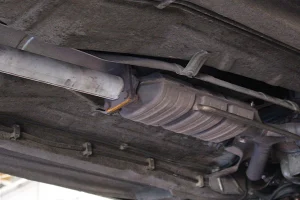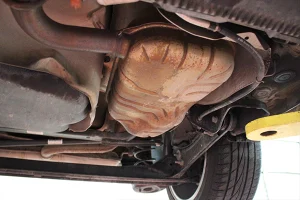As cars are a daily part of most American’s lives, we tend to get very used to the way our specific vehicle drives, feels, looks, and even smells. This means it’s easy for most to notice small changes and issues in our vehicles immediately.
While most issues in cars affect how it feels to drive, you might also notice a change in how your vehicle smells.
Vehicles produce a range of odors in countless ways, from the engine’s exhaust to the smell of burning oil or coolant. These smells might be noticeable, but they pale in comparison to the distinct odor of rotten eggs emanating from your vehicle. It’s hard to miss.
4 Reasons Your Car Might Smell of Sulfur/Rotten Eggs
Bad Catalytic Converter
A failed catalytic converter is by far the most common reason for this less-than-desirable odor from your vehicle.
Catalytic converters are responsible for “cleaning” the engine’s emissions by removing harmful pollutants from exhaust gasses.
The “rotten egg” smell is often a product of hydrogen sulfide, a pollutant byproduct from combustion engines. Usually, this compound is converted into odorless sulfur dioxide by the catalytic converter, however, when there has been a failure within the catalytic converter this conversion will not take place and allow for hydrogen sulfide to exit the exhaust system.
A failed catalytic converter can lead to a host of issues, but the most immediately noticeable might be a strong sulfur smell. If you suspect yours might be failing, you should have the problem addressed by a trusted professional as soon as possible. Otherwise, your vehicle may experience engine misfires, reduced performance, or could even catch fire.

Leaking Manual Transmission Fluid
While the catalytic converter might be responsible for most cases of rotten egg odor, leaking transmission fluid may also be the perpetrator.
Your vehicle’s transmission fluid helps to cool, lubricate, and provide hydraulic pressure for your gears, however, the fluid often has a pungent smell similar to the hydrogen sulfide we talked about earlier.
This generally only happens on manual transmission vehicles, as older manual transmission fluids were often sulfur-based.
The easiest way to check this is to ensure your transmission fluid level has not dropped significantly and that there are no visible leaks around the transmission pan. If you do have a leak, it should be taken care of as soon as possible to avoid damage to your transmission.
Failed Fuel Pressure Sensor or Fuel Filter
The fuel pressure sensor helps regulate the amount of fuel within the fuel rail. When the sensor is experiencing issues, it may allow excess fuel to enter the engine and cause the vehicle to run rich.
With this extra fuel to burn, there will be more pressure put on the catalytic converter. This can clog the catalyst, and allow unfiltered fumes to make their way through the exhaust.
This same issue can occur with a clogged fuel filter, as it can also lead to the vehicle running rich and allowing increased pollutants from your exhaust.
Exhaust Leaks
If the exhaust has a leak prior to the catalytic converter, the fumes leaking out will contain the pungent hydrogen sulfide.
Most exhaust leaks will also be accompanied by increased engine noise, as they allow for sound to exit the exhaust before reaching the resonator and muffler.
Fixing this may be as simple as patching a small crack in the exhaust manifold, or could require the replacement of an exhaust component.

Exhaust Diagnostics and Repair in Riverton
If you’re experiencing a strange smell or sound from your exhaust system, don’t delay having it diagnosed and repaired by a trusted automotive professional.
The ASE-certified technicians at Matson Point S in Riverton have the expertise and equipment to properly inspect and repair your exhaust! Call or schedule online with us today.

